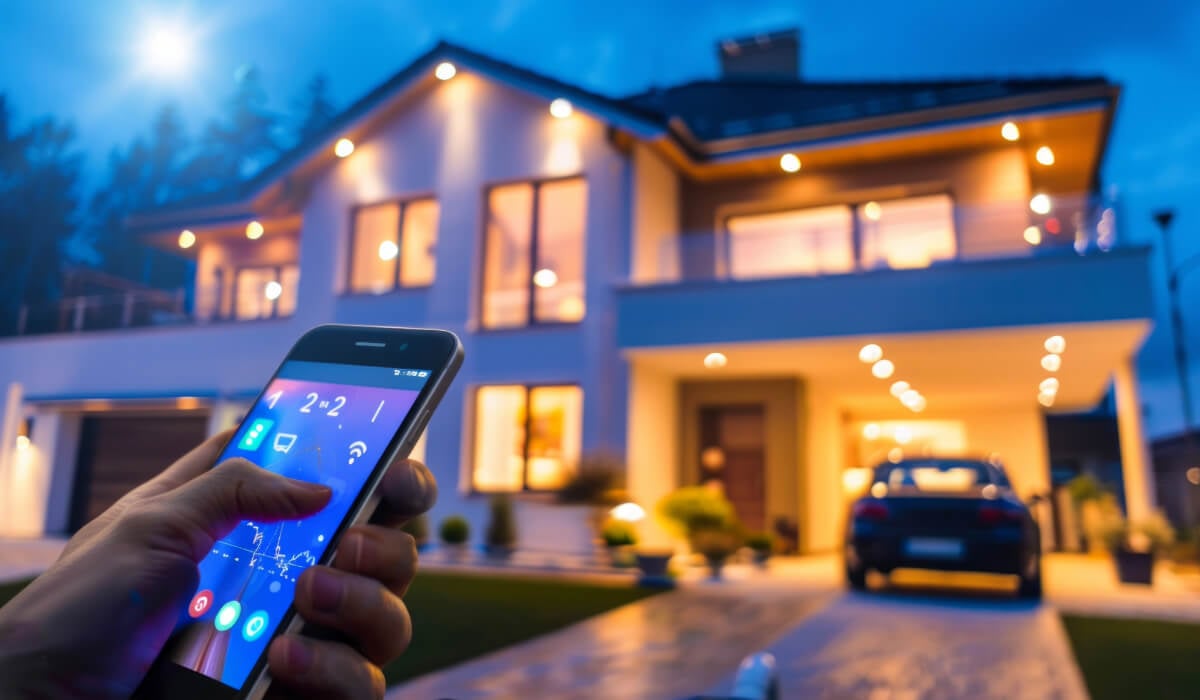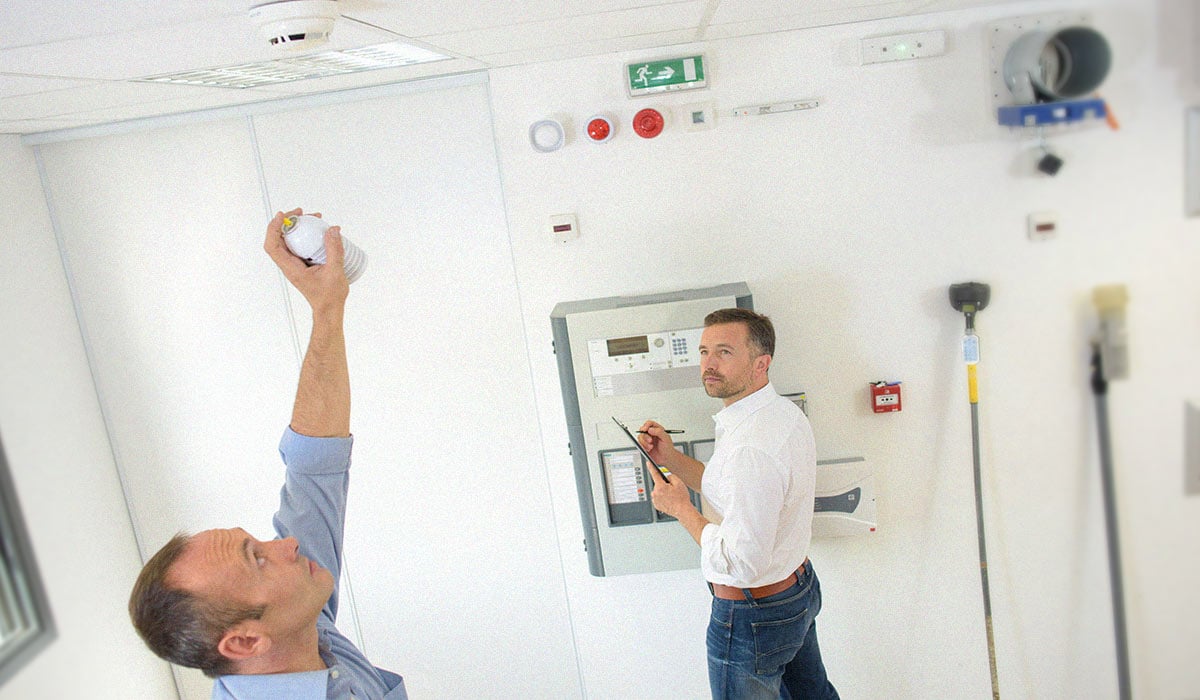Frequently Asked Questions
About Residential & Commercial Security
Here’s a helpful breakdown of everything you need to know about your home and commercial security systems’ features, benefits, available packages, costs, service offerings, and more.
A technologically advanced home security system with smart components can safeguard and protect your home, property and loved ones, whether you’re there or not. In addition to traditional equipment such as burglar alarms, contact sensors and security cameras, you can also add other monitoring features such as fire and life safety devices, flood sensors, smart thermostats, wellness and energy management features, and 24/7 Central Station Monitoring.
The exact cost depends on variables centered around your specific needs. Basic alarm systems include a panel/keypad, three to six window contacts and a motion sensor, while higher-end models feature multiple security cameras, health and safety components, remote check-ins, and smart home automation.
While most brands cost about the same, you’ll pay more for upgrades such as indoor, outdoor, and doorbell cameras; smart home automation; additional motion sensors; and other technologies.
A Central Station alarm connects your home to law enforcement in the event of an intrusion, greatly increases your chances of preventing criminal activity, and can potentially save thousands of dollars or more in lost property and home insurance claims.
A Central Station monitoring center features operators standing by, 24/7. When a home alarm is triggered, the monitoring center attempts to verify the cause by contacting the homeowner.
As you craft a home security plan, consider areas in and around your home requiring the most protection. This can vary by need, size, and budget. If your goal is contactless, front-porch deliveries and monitoring, consider doorbell or front-door cameras.
To ensure protection from dangerous carbon monoxide and smoke, it’s recommended to add fire and life safety systems. Also consider smart technology solutions Wellness and Wellcam to keep a watchful eye on elderly loved ones who live independently.
Regardless of your decision, it’s best to enlist a reputable provider such as General Security to assist with building and customizing the best solution for your needs.
Smart homes are residences equipped with technology and devices enabling key household features to be interconnected and controlled via desktop, tablet or smartphone, while streamlining management and increasing efficiencies in the process. These systems integrate with the internet, and each connected device is equipped with Wi-Fi-enabled sensors that can be managed via smartphone, tablet or laptop—either from home or remotely.
Smart home automation facilitates the management of everything via one connection for real-time information into what’s going on at your home, at all times.
Before deciding how to handle your home security system when moving, it’s best to have your current provider survey the new property. While each situation is unique, most will recommend purchasing and installing a new security system, for various reasons. Leaving the current system can also attract prospective buyers craving the added peace of mind of home security.
While wireless models could possibly be moved, wired setups with various integrations and equipment require added steps, and can be cumbersome to extract and transport. Removal can be a messy process for either—with resulting holes, marks, or other damage left behind when uninstalling the current system.
With most basic systems consisting of control panels, security cameras, and contact sensors, the current equipment might not be compatible with your new home’s setup and wireless connections.
It’s advisable to contact your current security provider and alarm company within 30 to 60 days of moving so they can schedule any appropriate actions, such as system installation, surveys and recommendations, billing, and other housekeeping matters.
Several important factors should be considered when deciding which model to purchase, such as network interconnectivity, smart applications, image resolution, and more. With many camera types available, installing the best depends on needs, space, and budget. General Security offers various interior and exterior types and styles, including bullet, dome, high definition, thermal imaging, IP, analog, wireless, and doorbell cameras.
Both do-it-yourself (DIY) and professionally installed systems provide real-time alerts—with the latter additionally featuring installation and ongoing maintenance services by trained experts. These experienced providers can recommend the best placements for your alarm’s motion sensors, window and door contacts, and security cameras. They also employ best practices to prevent intruders from tampering and bypassing these devices.
DIY packages usually don’t require service contracts and other fees. While this could be helpful on a budget, it’s wise to check the fine print to be sure. Purchasing the equipment through a local provider is best for assistance and answers to follow-up questions.
When connecting home security cameras, ensure they’re compatible with the device’s hardware, software, and internet connection. Working with an Alarm.com partner such as General Security is a good starting point. Both wired and wireless cameras can utilize the app for remote viewing—the latter running through your location's wireless network.
Implementing an alarm and monitoring system with video surveillance can alleviate worries regarding break-ins, intrusions, and other life and safety issues when you’re not home. When utilizing remote video surveillance, you’ll have several important benefits, such as 24/7/365 monitoring and awareness, real-time alerts, professional video analytics, and Alarm.com mobile app features.
If you inadvertently trigger your home’s alarm system, a Central Station Monitoring specialist will contact you via phone to confirm or cancel the alarm as necessary. Those utilizing Alarm.com, can also opt to receive text and email notifications. You can also confirm the incident is a mistake by providing the specialist your security code.
Should you be out or away from home, the specialist will attempt to contact the primary designated person(s) on your emergency contact list.
Motion sensors are a common home security component, requiring additional attention in households with pets. These can be programmed to ignore movements of small and medium-sized animals—typically those less than 40 pounds, although some can identify pets up to 80 pounds.
If you own a larger animal but still want to take advantage of motion detection, you may have to change the location of the sensor, or restrict pet access at home. Motion sensors work best when placed in main, central living areas, so be sure to block these off.
In certain situations, you might want to bypass a specific sensor or zone, so it can be opened without triggering the alarm system. Each system is different, but bypassing a zone can easily be done from your keypad or smartphone if your system is capable.
Because each alarm panel has different requirements and settings, it’s best to consult your home security provider for specific instructions.
Whether you choose a wired or wireless security system, both are suitable for most applications. Operating via Power over Ethernet (PoE), wired is best for larger properties, as it can support multiple devices without taxing your network.
Consider wireless versions for more temporary or smaller spaces not requiring extended coverage. An added convenience is also not having to drill holes or installing cumbersome wires. If you choose to upgrade or replace your system, it can be easily removed and uninstalled without major interference and alterations.
Prior to installing the Alarm.com mobile app, you’ll have to first set up an account through a service provider, such as General Security. You'll then be able to set customized configurations, rules, alerts, motion detection, and other smart technologies for additional security. This includes everything from security cameras with remote viewing, energy and wellness management, fire and life safety devices, and others.
With home security solutions providing increased safety and security, and improving property values, some insurance companies might also offer up to 10 percent discounts on homeowner policies. It’s best to check with your designated company for exact amounts and qualifications.
If you already have a home security system or have been thinking of adding one, it’s prudent to extend these safeguards to your place of business and commercial property for 24/7 monitoring and protection.
Designed to keep trespassers, intruders and burglars at bay, commercial security systems also provide real-time monitoring and surveillance, access control, and fire and life safety. Employee communications and productivity can also benefit.
Similar to home security systems, the cost of installing and maintaining a commercial security system is built on various factors, such as existing space, equipment types and technologies, smart integrations, and others.
To learn more about what’s best for your place of business, it’s best to contact General Security for an on-site survey, inspection, and free quote.
By adding a security system with access control entry or keycard systems, intercom/entrance systems, and security cameras with video surveillance, you can fully customize who has access to certain areas, while also keeping a watchful eye on things at any time.
See additional questions below for a detailed description of each.
Also referred to as telephone entry systems, two-way intercoms provide an extra security layer for employee, property, and asset protection. When implemented at your facility’s entrance and exit points for access control, this also keeps any persona non grata at bay.
Along with visuals of the parties requiring entry through two-way video and audio, consider combining this with front-door cameras for additional security and contactless communications. With the help of smart technologies, such features can be controlled on-site or remotely.
These swipe, magnetic, or ID keycards or key fobs are read by smart doors and entryways. When the employee or authorized guest swipes, taps, or inserts their keycard, its magstripe or chip grants access through a uniquely designed code. After the card reader accepts the authorized access credential, it sends a quick signal to the specified door or entryway to unlock.
When combined with other smart systems, keycard technology provides other safeguards, such as personalized access levels, safety audits, and employee activity log management.
When working with an Alarm.com partner such as General Security, you’ll also have access to Business Activity Analytics for strategic monitoring and management practices. Business owners can add technologies, such as virtual rules around motion detection or group gatherings, as part of their security camera package. These technologies include virtual tripwires for occupancy and people-counting measures, as well as heat mapping, queue monitoring, and crowd gathering. Not only does this transform the way you protect your business, it also automatically generates weekly or monthly reports with invaluable insights.
Commercial security systems can also monitor important internal data, such as employee productivity and arrival/departure times, customer traffic and marketing analytics, and inventory tracking. In some cases, it can even reduce insurance costs.
According to the National Fire Protection Association, fire departments throughout the United States respond to a blaze every 24 seconds—with a structural fire occurring every 63 seconds. With these startling numbers, adding fire and life safety to protect your employees and commercial property is a must. Having regularly maintained and inspected devices such as carbon monoxide detectors, and smoke and fire alarms, can be the difference between injuries, damages, and even death.
Yes. General Security has partnered with RingCentral to offer VoIP phone systems to commercial and small businesses. Whether you’re currently working with us, or are thinking of adding a system, we can assist as your one-stop shop for all your security and communication needs.
When integrated with a smart commercial security package, a VoIP solution through RingCentral facilitates a full selection of communication tools for ease of use, scalability, flexibility, and more.
Wired security cameras are well suited for new construction projects. Loud power tools and opening walls during installation can disrupt an already-occupied area. For an existing space, it’s best to work with an experienced installer who can implement a drilling and fishing method. This involves running cables and wires through walls and ceilings without disturbing the current structure. For leased spaces, it's best to check with the building management prior to indoor or outdoor installation, as some may not permit tenants to alter an existing structure.
A wireless connection's absence of cords and cables make installation easy for any DIYer—with 24/7 video analytics, reporting and monitoring available via any smartphone, tablet, or laptop. Visual search matching and minimal false alerts are two additional pluses.
Hard-wired cameras have an established track record when it comes to development and best practices. Wireless holds its own, but there are still existing security measures that must be taken into consideration.
Yes. This can be accomplished by downloading the Alarm.com app and setting customized rules and notifications for each functionality. In addition, when implementing access control systems, keycards can be integrated within your building’s existing security management system and smart features. Smart settings and real-time alerts can automate your property’s lights, thermostat, locks, security and doorbell cameras, and more.
Get in Touch With Us Today!
Learn more about how General Security can assist your home, business, or both with protection and safety measures.
Contact us for more information, or to request a free quote.
Blogs & Industry News
As security technologies change within for both home and commercial use, we're always on the cusp of what's new and groundbreaking. Learn more about the latest news and information on security cameras, video analytics, smart technologies, alarm systems, remove viewing, carbon monoxide and fire safety, and others.
Our United Central Station Achieves Elite TMA Five Diamond Security Certification
United Central Station earns TMA's Five Diamond Monitoring Center designation for enhanced protection for home security systems and commercial alarm monitoring.
Read MoreHow to Keep Your Home Safe While You’re Away
Set your system to vacation mode, use a smart door lock, and an integrated wireless home security camera system to keep your home safe while you're away.
Read MoreTop 5 Fire Safety Tips for Commercial Businesses
Review these fire safety tips and consider how commercial security systems can greatly benefit from the right fire protection services, plans, and technology.
Read MoreFlexible Security Systems for Business Growth
Upgrade to a scalable commercial security system that supports your growing business, offering better integrated solutions than small business security systems.
Read More



